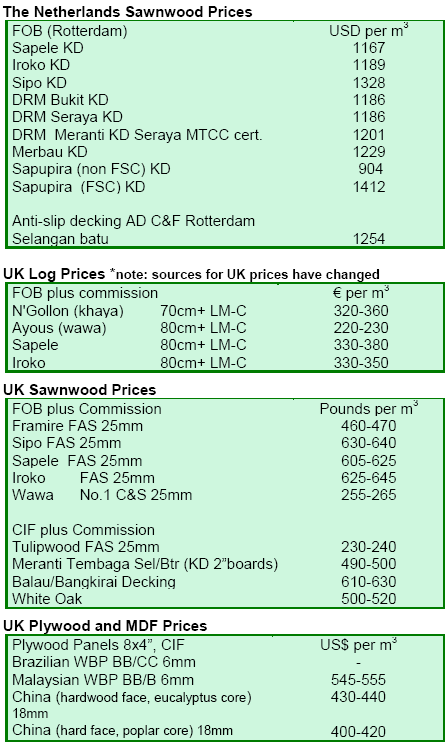|
Report
from Europe
and the UK
European biofuels use may divert wood supply from
traditional industries
A fierce debate is emerging in Europe over the legitimacy
of policies to increase use of biofuels as a means of
countering carbon emissions and climate change. The
debate has very significant and yet rather uncertain
implications for the European and international forest
sectors.
Many environmental and wood sector interests have
responded with dismay to EC and European national
government commitments to increase reliance on biofuels.
A concern for industry is that increased use of wood
for biofuel production is already diverting large volumes
of raw material away from traditional wood-using
industries and this problem is likely to worsen in the
future. At the same time, environmental groups are
concerned that increased demand for biofuels without
linkage to tough environmental safeguards will simply
divert the focus away from policies designed to reduce
energy consumption while at the same time increase
pressure to convert slow-growing natural and semi-natural
forests to intensive short-rotation plantations and fuel
crops.
Recent concern has focused on a proposal issued by the
European Commission in January 2008 for an EU
Renewable Energy Directive which includes a target of
increasing the amount sustainable fuel used in the
transport sector to 10% by 2020. This has generated a
barrage of criticism from EU Member States, research
organizations and environmental NGOs.
Even before the proposal was announced, research
released by organizations including the Royal Society - the
Joint Research Centre, the European Commission¡¯s inhouse
science and research group, the UK Parliament
Environmental Audit Committee (EAC) and a number of
NGOs suggested that in the absence of Commission plans
to significantly reduce overall transport volumes, the
target could only be met by a massive boost in use of biofuels.
In February 2008, the UK government weighed in
with an announcement that they intend to undertake their
own review of the environmental impacts of bio-fuels
stating that: ¡®we are not prepared to go beyond current UK
target levels for bio-fuels until we are satisfied it can be
done sustainably¡¯. Around the same time, the Dutch
environmental assessment agency also issued a study
which found that the 10% target ¡®should be reconsidered¡¯.
The criticism came to a head on 10 April 2008 when the
European Environment Agency¡¯s Scientific Committee
recommended that the 10% agrofuel target be suspended.
The Committee stated that ¡®[t]he overambitious 10 per
cent biofuel target is an experiment, whose unintended
effects are difficult to predict and difficult to control¡¯. The
European Parliament is now preparing its amendments to
the proposed Directive in light of these recommendations.
Meanwhile, research undertaken by the UN Economic
Commission for Europe (UNECE) together with FAO
indicates that existing far-reaching policy commitments by
European governments to increased use of bio-fuels have
very significant potential to greatly reduce available wood
supply in the EU. The UNECE/FAO study on ¡®Wood
resources availability and demands ¨C implications of
renewable energy policies¡¯ reveals that a huge amount of
biomass will be required to fulfill the existing policy
commitments of European governments. It forecasts a
significant ¡°gap¡± opening up between sustainable wood
supply and the amount of wood required to both fulfill
energy objectives and support a growing wood based
industry in Europe. This gap is estimated at between 321
million m³ and 448 million m³ by 2020.
The results of the UNECE/FAO study are even more
extreme than those of a similar study commissioned by the
Confederation of European Paper Industries (CEPI) which
has suggested that the gap between supply and demand for
wood in European countries may exceed 200 million m³
by 2020.
Forest sector interests in Europe are now lobbying hard to
encourage policymakers to ensure that commitments to
renewable energy sources are realistic and based on an
integrated view of competing land uses and products, and
calling for sustainable production and use of biofuels.
There is also growing concern to find mechanisms to
increase mobilization of wood resources within the EU ¨C
particularly from small private forest holdings - in order to
satisfy the anticipated increase in demand.
Danzer Group to offer expansive range of FSC
products
The Danzer Group is expanding its range of FSC products
on offer. Currently, the Group offers a wide selection of
Forest Stewardship Council (FSC) Pure and FSC
Controlled Wood-certified veneer and lumber. According
to a press release issued by Danzer, the Group will soon
offer African logs, lumber and veneer with the FSC-Full
label. Noting that the demand for certified wood is
growing, Mr. Olof von Gagern, Danzer Group CEO for
Veneer Europe and Lumber Europe/Africa, said that the
FSC certificates would offer customer assurance that
Danzer wood products are from legally and sustainably
managed forests.

|